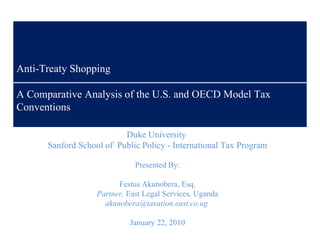Anti-Treaty Shopping: A Comparative Analysis of the U.S. and OECD Model Tax Conventions
•Download as PPT, PDF•
4 likes•4,026 views
The presentation highlights the key approaches taken by the U.S. and the OECD to combat treaty shopping techniques and highlights key differences between those approaches.
Report
Share
Report
Share

Recommended
More Related Content
What's hot
What's hot (20)
Double taxation avoidance agreement between india and canadarhejkrhfk

Double taxation avoidance agreement between india and canadarhejkrhfk
CONFLICT OF SOURCE AND RESIDENCE PRINCIPLES OF TAXATION

CONFLICT OF SOURCE AND RESIDENCE PRINCIPLES OF TAXATION
A close look into double taxation avoidance agreements with india some releva...

A close look into double taxation avoidance agreements with india some releva...
Relevance of double taxation avoidance agreement and its impact

Relevance of double taxation avoidance agreement and its impact
ICAI-WIRC Pune - Presentation on DTAA - 22.12.2011

ICAI-WIRC Pune - Presentation on DTAA - 22.12.2011
Similar to Anti-Treaty Shopping: A Comparative Analysis of the U.S. and OECD Model Tax Conventions
MAZARS Luxembourg - New substance requirements for holding and financing comp...

MAZARS Luxembourg - New substance requirements for holding and financing comp...Quentin Van Gansberghe
Similar to Anti-Treaty Shopping: A Comparative Analysis of the U.S. and OECD Model Tax Conventions (20)
UN Model Tax Convention Vs OECD Model Tax Convention Significance of Distinction

UN Model Tax Convention Vs OECD Model Tax Convention Significance of Distinction
Group 6 Presentationsdaaaaaaaaaaaaaaaaaaaaaaaaaaaa

Group 6 Presentationsdaaaaaaaaaaaaaaaaaaaaaaaaaaaa
MAZARS Luxembourg - New substance requirements for holding and financing comp...

MAZARS Luxembourg - New substance requirements for holding and financing comp...
Presentation on dtaa by sirc institute of ca dt.14 3-09

Presentation on dtaa by sirc institute of ca dt.14 3-09
Tax Guide to Overseas Real Estate Investments for U.S. Investors

Tax Guide to Overseas Real Estate Investments for U.S. Investors
New Legislation Enhances the Benefits of a Section 1042 Tax-Deferred Sale

New Legislation Enhances the Benefits of a Section 1042 Tax-Deferred Sale
Prevention of hybrid mismatches as a justification

Prevention of hybrid mismatches as a justification
Case alert Investment Trust Companies - Supreme Court

Case alert Investment Trust Companies - Supreme Court
Anti-Treaty Shopping: A Comparative Analysis of the U.S. and OECD Model Tax Conventions
- 1. Anti-Treaty Shopping A Comparative Analysis of the U.S. and OECD Model Tax Conventions Duke University Sanford School of Public Policy - International Tax Program Presented By: Festus Akunobera, Esq. Partner, East Legal Services, Uganda akunobera@taxation.east.co.ug January 22, 2010